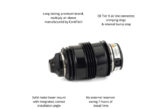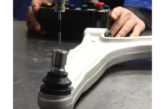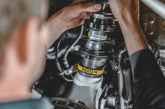Andy Savva explains why garage owners shouldn’t sell themselves short.
Andy Savva is a former multiple independent garage owner who boasts over 30 years’ experience in the automotive repair sector. In every issue of PMM he’ll be sharing his advice with workshop owners who want to improve their business’ bottom line, but simply don’t know how to go about it.
You must believe that you are entitled to make a profit on the products and services you offer to your clients – and, more importantly, a profit which reflects the risk and responsibility that accompanies entrepreneurship. There are too many garage owners who act as though what they are making is, somehow, too much, or are actually afraid to say: “I am in business to provide a service and make a reasonable profit”. It is not a crime to make a profit – you should be proud of it, and more importantly, communicate it to all of your employees.
No one is ever going to confront you demanding that you raise your prices to remain in business. No one ever stormed into any of my garage businesses insisting that I was too cheap – even when I thought we were! I’ve explained in previous articles how you must calculate the base cost of your labour rate, and using that, work out the charge rate for financial security, in order to enable your business to grow.
If the prices you are charging are not justified by the quality of service you believe you are providing, it’s time to re-evaluate. Along with the efficiency of your workshop, the correct labour charge is one of the key factors involved in improving your business. Rather than allowing ourselves to become more dependent on what our neighbours are or are not doing, we should be setting our prices based on our actual cost of doing business.
I cannot emphasise enough the need to factor in all the outgoings of your business before establishing the labour charge, remembering that you never sell every hour available to you. In my experience visiting garages throughout the UK, the average is around 60%, but aiming for 80% is realistic. This is critically important because productivity has a profound impact on profitability, which is why I have always focused so much on streamlining processes, from the initial enquiry to hanging the car keys back to the client without affecting quality of service. This will allow technicians to spend more time with spanner in-hand, earning the business revenue.
If the total cost of business is not recovered, you will not make a profit. If labour revenues don’t exceed your cost, you will experience a loss. To avoid that, you have to know the costs associated with running your garage, and those costs must take into account the productivity of each ramp/technician. Only then can you determine if your prices are reasonable and competitive for your market area, and for the products and services you provide.
I turn my attention to profit on parts – which cannot be overstated. Too often, I see the profit margin on parts as the only revenue keeping the garage open and the owner in business. Garage owners have consistently subsidised their aftersales service through a lack of knowledge and understanding. They will absorb the costs involved in performing repairs, especially servicing, with artificially low labour charges. This cannot continue. Why should you subsidise your labour?
The continuing escalation of rent, rates, insurance, salaries, training, tooling and equipment should dictate that a reasonable profit on parts (an average margin of 40%), in conjunction with an adequate labour charge is critical for survival.
Your prices should reflect the investment you put into tools, training, technology, equipment and, of course, personnel. You also need to understand the huge changes taking place in our industry, especially technology, as well as the acute shortage of competent technicians and the investment that must be made to leverage the ability of those who remain (my annual training budget at Brunswick Garage was £36,000).
You must anticipate and accept change as a natural part of the future and seize the opportunities that come with change. I knew exactly what my products and services cost and how much margin it would take to make a reasonable profit. I also knew only too well that my investment (a garage) only had one source of income, and that was our customers (the vehicle owners). I knew that I had to charge for diagnostic time, but even more important was to explain to the customer why there would be a charge.
Perception is reality. In our world, the only thing that matters is the customer’s perception of us and our business. In the end, we are all governed by the customer’s perceptions of the quality of the service they have received and paid for. As professionals, it is our responsibility to educate our customers, showing the quality and value- added service we are both willing and able to provide in order to separate us form the norm – and make a profit.










